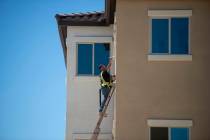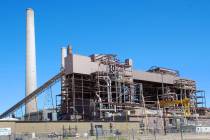Energy Star adds system
Home Energy Rating Systems scores are helping homeowners better understand just how energy efficient their homes are -- or aren't.
According to Annette Bubak, president of Nevada Energy Star Partners, a coalition of builders, manufacturers, utilities, consultants and other conservation-minded companies, knowledge is power and it's the first step to determining how to can make your home more energy efficient.
A scoring system established by the Residential Energy Services Network, HERS uses an index to score the energy-efficiency of homes. A net-zero home that generates as much power as it uses would score a 0, so the lower the score, the more energy efficient the home. Most resale homes today score around 100. Each one point decrease in the HERS index corresponds to a 1 percent reduction in energy consumption.
An index score of 100 is equivalent with the 2006 International Energy Conservation Code. Thus, a home with a HERS index of 85 is 15 percent more efficient than a home built to 2006 IECC standards. According to Bubak, a home built in compliance with Energy Star standards also has a HERS index of 85, which means the home is 15 percent more efficient than code.
"Some new homes are even more energy efficient than a score of 85 because of advanced building practices," Bubak said. "There are many homebuilders in Las Vegas that have been building to Energy Star standards for years. Thanks to their commitment and vision, Southern Nevada is leading the country in the number of Energy Star homes."
In fact, the number of Energy Star homes in Southern Nevada has grown from fewer than 100 in 1998 to more than 78,000 in 2008.
"The environmental benefits of these 78,000-plus homes is the equivalent of eliminating emissions from more than 37,000 vehicles, saving more than 227 million pounds of coal, planting more than 62,000 trees or saving more than 445 million pounds of carbon monoxide each year," Bubak said.
By 2011, a new law will be in effect that requires all home sellers to disclose the home's energy audit.
According to Bubak, this will allow homebuyers to fully understand the energy efficiency or lack thereof, of a home before they buy it.
If you live in an older home, Bubak said it's even more important to score your home so you can identify where your home is losing energy. "Commonly, older homes lose energy due to leaks in duct work, the HVAC system and the outer envelope of the home that includes all openings, such as doors and windows, inefficient windows and insulation," she said.
An energy audit will help determine the HERS score by running comprehensive tests and evaluations. Homeowners can then make minor (low cost) or more drastic changes (higher costs) to their home to increase its efficiency and in the long term, enjoy significant savings on utility bills.
In addition to reduced utility bills, the preservation of natural resources and increased energy conservation, there are additional benefits to making your home more energy efficient. NV Energy offers many rebates to homeowners to improve the energy efficiency of their home and there are many tax incentives available as well.
For a list of professionals capable of conducting these energy audits, visit thinkenergystar.com.
"Thinkenergystar.com is also a great resource to help you turn an energy hog home into a higher energy efficient home," Bubak said. "It's the right thing to do -- for the planet, for your home and for your budget. It's a smart move to learn more about how your home is performing and how to make changes that fit your budget in order to lower your energy costs. In times like today, having an energy audit does help a home owner take control of their energy expenses. It's a win/win decision -- economically and in being part of the solution."
Energy Star, the national government symbol for energy efficiency, was created by the United States Environmental Protection Agency originally for energy-conserving computers in 1992 and is now jointly implemented with the U. S. Department of Energy.
Since its origin, the program has been expanded to include more than 60 products categories that conserve energy and protect the environment -- from appliances, electronics, lighting, windows and office products to homes and mortgages.
Energy Star products use less energy which reduces consumption of fossil fuels and resulting air pollution according to Bubak.
Now in its ninth year, Nevada Energy Star Partners was recognized in April 2009, by the EPA at a ceremony in Washington, D.C., with its most distinguished award, Sustained Excellence. This is the seventh consecutive year Nevada Energy Star Partners has received this award -- a feat accomplished by no other Energy Star partnership in the country.
For more information, visit thinkenergystar.com.























